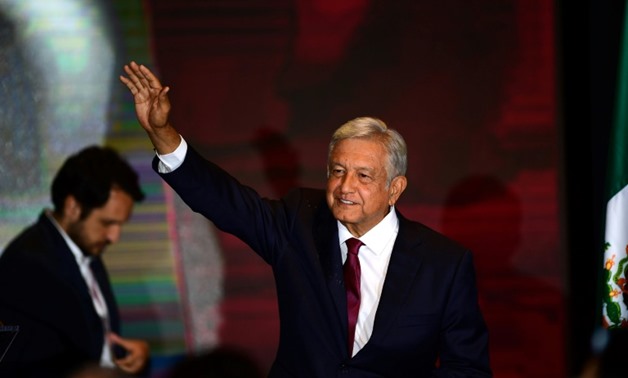
Newly elected Mexico's President Andres Manuel Lopez Obrador, running for "Juntos haremos historia" party cheers his supporters at a hotel after winning general elections, in Mexico City, on July 1, 2018
4 - July 2018: Mexican president-elect Andres Manuel Lopez Obrador lost no time Tuesday in preparing the transition to "profound change" in the country, promising to invite Pope Francis in an effort to restore peace and announcing a meeting with US Secretary of State Mike Pompeo.
The anti-establishment leftist known as "AMLO" won a resounding victory in Mexico's elections Sunday, claiming 52.96 percent of the vote, according to a near-complete count -- more than 30 points ahead of his nearest rival in the four-way race.
"We are going to invite Pope Francis," as well as "religious leaders, UN and human rights officials to bring everyone together with the goal of achieving peace in our nation," Lopez Obrador said after talks with outgoing leader Enrique Pena Nieto.
Lopez Obrador, 64, successfully tapped voters' anger over a seemingly never-ending series of corruption scandals and horrific violence that resulted in a record 25,000 murders last year.
The president-elect said he would meet Pompeo for talks which officials said would take place during a visit to Mexico by Pompeo on July 13. Pompeo will also meet Pena Nieto and Foreign Minister Luis Videgaray.
Lopez Obrador will be the country's first leftist president in recent history when he takes office on December 1.
He met Tuesday morning with advisers in his campaign headquarters, before meeting Pena Nieto at the National Palace.
Pena Nieto said Monday he had called Lopez Obrador to congratulate him and offer his support to provide "all the necessary elements during the transition period."
Lopez Obrador's victory is the first time in Mexico's modern democracy that a candidate has won more than half the vote.
It amounted to a resounding rejection of the two parties that have governed the country since 1929, the ruling Institutional Revolutionary Party (PRI) and conservative National Action Party (PAN) -- especially the former.
The PRI ruled Mexico as a single-party state for 71 years, was ousted at the ballot box in 2000, then convinced voters to give it a second chance in 2012.
Many Mexicans would live to regret it: after six years of scandals, human rights violations, lackluster economic growth and horrific violence, Pena Nieto is poised to leave office as the most unpopular president in recent history.
- Strong mandate -
Lopez Obrador's coalition -- led by the party he launched in 2014, Morena -- also won a majority in the lower house of Congress, and was within striking distance of doing the same in the Senate, according to exit polls.
That gives him a strong mandate to effect the "transformation" he has promised.
But many Mexicans are also nervous over what Lopez Obrador's brand of change will look like.
Critics call him a "tropical Messiah" who will install Venezuela-style policies that could wreck Latin America's second-largest economy.
"We are not looking to construct a dictatorship, either open or hidden," Lopez Obrador said in his victory speech, promising to safeguard freedoms, respect the private sector and work to reconcile a divided nation.
- Soothing markets, wooing Trump -
But there are lingering market jitters over a politician who clashed openly with the business sector during the campaign.
Lopez Obrador's economic team spent the day Monday in conference calls with investors, seeking to reassure the markets.
The team is led by respected economist Carlos Urzua, Lopez Obrador's pick for finance minister.
In a recent interview, Urzua told AFP he would pursue fiscally responsible policies, pledging to safeguard the central bank's autonomy, balance the budget and respect all state obligations with the private sector.
Lopez Obrador has also been keen to start off on the right foot in another potentially tricky relationship: with US President Donald Trump.
Trump called Lopez Obrador to congratulate him Monday, and the president-elect said he had proposed a plan to reduce US-bound migration and improve security in Mexico.
"We had a great talk," said Trump, whose anti-immigration, anti-trade policies have deeply strained Mexico's ties with its giant northern neighbor and key trading partner.


Comments
Leave a Comment